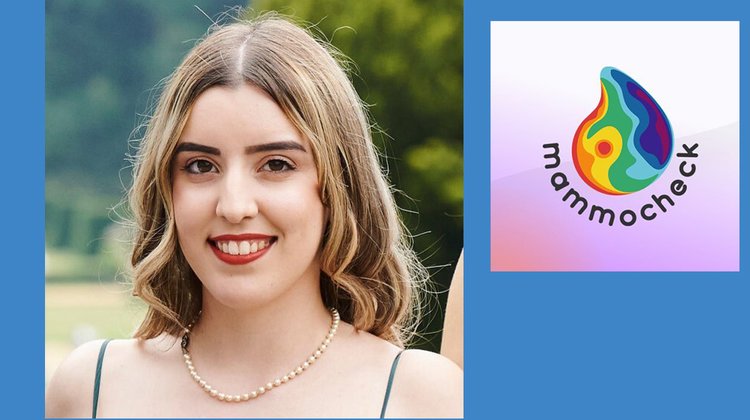Introducing the Cypriot startup MammoCheck
07:30 - 22 January 2024

Today’s consumers have at their disposal an arsenal of wellness technologies that can monitor a comprehensive spectrum of physiological metrics, from heart rate to glucose levels to sleep cycle.
These advances offer an unprecedented level of control over personal health from the comfort of one’s home. MammoCheck, a spinout of Frederick University, is betting that it can provide the same level of control for breast cancer examinations. The startup’s ambitious pursuit will be underpinned by an application where an algorithm would indicate the presence of a tumour through photos taken by a thermal camera. “We are not claiming that we will replace mammograms; our goal is to help women become more health-conscious,” explains Alexandra Dimitriadou, the startup’s co-founder and CEO.
According to the World Health Organization, between 2015 and 2020, 7.8 million women were diagnosed with breast cancer. While the median age of diagnosis is 62, some 11% of new cases affect women under 45. Experts have long proposed early detection and prevention as the key strategies for tackling cancer, a sentiment that the startup echoes. Dimitriadou also notes that early detection measures consume far fewer resources when treating diseases, a boon for national healthcare systems that tend to burn through cash fast. Indicatively, for 2024, over half of the €1.3 billion budget of Cyprus’ Health Ministry will go to the national health system.
Thermal breast imaging, also known as thermography, has been around since the ‘60s, with the rationale being that the skin overlaying breast cancer is warmer than the surrounding area. While initially gaining momentum as an alternative, pain-free breast cancer detection method, it struggled to progress as a diagnostic tool, producing far more false-positive results than health authorities were comfortable with. However, advancements in thermal cameras have drastically improved the sensitivity of the results, prompting health watchdogs to recommend the technology as complementary to mammograms. Nonetheless, Dimitriadou reiterates that the startup’s claim to fame is not the camera but its proprietary algorithm – the co-founding team, which includes a computer scientist specialising in AI (Marios Pafitis) and a neuroscience expert (Athina Grigoriou), gives it a leg up in competition, too. Having fed the algorithm with publicly available databases of thermal breast cancer photos, it yielded promising results, and in the next three months, MammoCheck plans to train the algorithm on a dataset built with the help of local doctors. Dimitriadou says the goal is for MammoCheck to launch in a Q2 2025. The cost will involve a one-time payment for the thermal camera and a subscription to the application. She says there are plans to apply for the EU’s coveted CE marking, which would allow the startup to market as a medical device – being non-invasive and contactless raises its chances of going through the laborious process successfully.
For now, Dimitriadou envisages MammoCheck as a pivotal link between routine breast cancer examinations. She says, “Based on family cases, there were cases where, while the mammogram was clear, they developed a tumour not long after.” And acknowledging the pervasive emotions of fear, anxiety and apprehension inherent in the anticipation of a cancer diagnosis, the startup harbours a noble ambition as it endeavours to forge a community platform, fostering a supportive environment for women grappling with these concerns. Dimitriadou wants the application to facilitate candid discussions and an exchange of invaluable insights, ultimately working to alleviate the profound distress associated with such challenging circumstances. She says, “We will practically provide them with an emotional support group.”
Founders: Alexandra Dimitriadou, Athina Grigoriou, Marios Pafitis.
What is it?: An affordable, non-invasive and painless method for conducting at-home breast cancer examinations.
Stage: Pre-seed.
What it aspires to be: A global leader in at-home breast cancer diagnostics.
Funds received: €10,000 (awards).
Funds needed: €300,000.
This interview first appeared in the December 2023 edition of GOLD magazine. Click here to view it.

